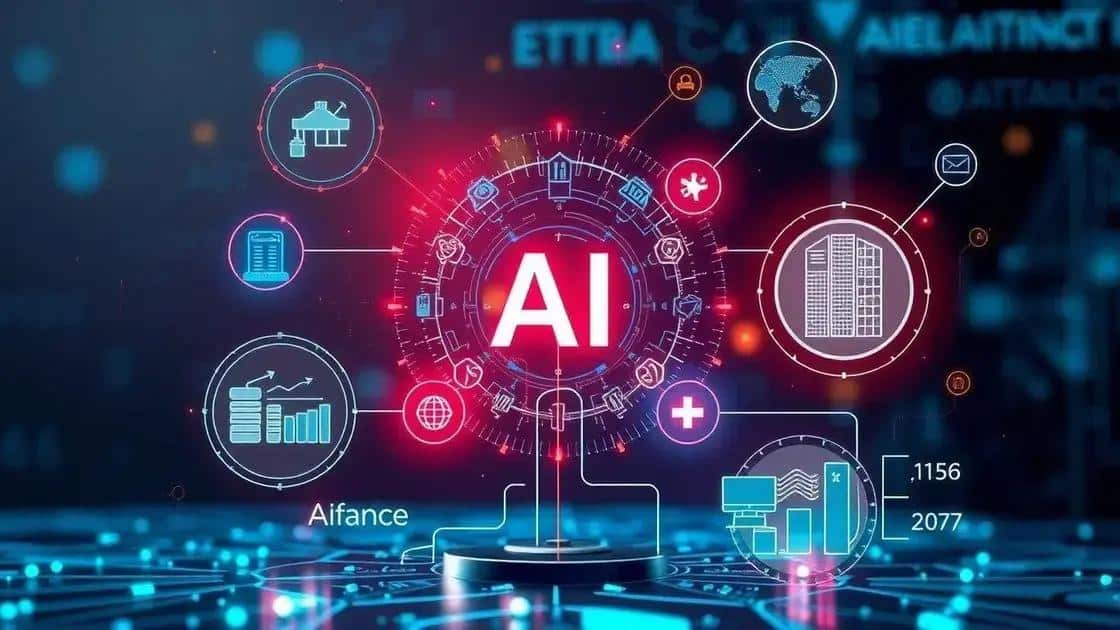Insights on ai innovation trends for businesses

Insights on AI innovation trends reveal that AI technologies improve efficiency, personalize user experiences, and transform industries like healthcare and finance, while also presenting challenges like data quality and integration.
Insights on ai innovation trends are crucial for anyone looking to thrive in today’s fast-paced market. Have you ever wondered how these advancements can reshape your business strategies? Let’s dive in!
Understanding current ai innovation trends
Understanding the current ai innovation trends is vital for companies seeking to maintain a competitive edge. Innovations in AI are shaping industries and changing how we interact with technology.
Key Trends in AI
Several trends are emerging in the world of AI. They range from advancements in automation to improvements in data analytics.
- Increased Automation: Many businesses are adopting AI tools for automating routine tasks, enhancing efficiency.
- Enhanced Data Analytics: AI technologies help in analyzing large sets of data swiftly, leading to better decision-making.
- Natural Language Processing: Improvements in this area enable machines to understand and respond to human language more effectively.
As we explore these trends, it’s important to understand how industries are leveraging AI to drive growth. For instance, healthcare providers use AI to analyze patient data, which improves care outcomes.
Innovative Applications
Industries are finding unique applications for AI. These varied uses highlight the flexibility of AI technologies. Consider the automotive industry, which is using AI for self-driving car technology, revolutionizing transport.
Retail businesses are also benefiting, implementing AI for personalized shopping experiences. This not only enhances customer satisfaction but also boosts sales.
From enhancing user experiences in software apps to optimizing supply chain management, the possibilities are expanding. Companies are realizing that embracing AI innovation is no longer optional but essential for survival in a rapidly evolving market.
Impact of ai on various industries

The impact of AI on various industries is profound and rapidly evolving. Companies across sectors are adopting AI to improve efficiency and profitability.
Healthcare Transformation
In healthcare, AI technologies are streamlining processes and enhancing patient care. AI-powered systems analyze patient data to predict outcomes, allowing doctors to make informed decisions.
- Predictive Analytics: Helps in early detection of diseases.
- AI-Assisted Surgeries: Improves precision and reduces recovery times.
- Personalized Medicine: Tailors treatments based on individual genetic profiles.
This innovation is reshaping the patient experience, making healthcare more effective and accessible.
Financial Sector Innovations
In the financial industry, AI is revolutionizing how banks operate. Financial institutions are using AI for fraud detection and risk management.
Automated trading systems analyze market trends, leading to smarter investment strategies. AI chatbots are also enhancing customer service operations, providing support around the clock. As these changes continue, the industry becomes more efficient and client-focused.
Manufacturing is another area where AI is making a difference. Robotic automation and AI algorithms optimize production lines, leading to reduced costs and increased output. Companies are turning to AI for predictive maintenance, preventing equipment failures by analyzing performance data.
As we see, the advances in AI technology are not limited to one field but span across various sectors, driving changes that improve service delivery and operational performance.
Challenges faced with ai adoption
The challenges faced with AI adoption are significant and multifaceted. As businesses seek to implement AI technologies, they encounter various roadblocks that can impede progress.
Data Quality Issues
One of the primary obstacles is the quality of data. AI systems rely on accurate and reliable data to function properly. Without high-quality data, the results produced by AI can be misleading.
- Inconsistent Data: Discrepancies in data sources can lead to errors in AI predictions.
- Data Silos: Departments may hoard data, making it challenging to compile comprehensive datasets.
- Bias in Data: If the training data is biased, the AI will also produce biased outcomes.
Addressing these issues requires meaningful investment and a commitment to data governance.
Integration Challenges
Another significant challenge is integrating AI technology with existing systems. Many businesses run on legacy systems that are not designed to work with modern AI solutions.
This can lead to increased costs and extended timelines for implementation. Workers may also need training to adapt to these new tools, which adds another layer of complexity.
Moreover, there’s resistance to change within organizations. Employees might fear that AI could replace their jobs, creating a culture of apprehension. Effective communication is vital to alleviate these concerns.
In addition, regulatory compliance remains a critical issue. Organizations must navigate complex regulations related to data usage and privacy, which can slow down adoption.
Overall, while the benefits of AI are significant, companies must proactively manage these challenges to successfully integrate AI into their operations.
Future predictions for ai technologies

The future predictions for AI technologies are exciting and filled with potential. As advancements continue, we can expect significant changes across various sectors.
Advancements in Machine Learning
One of the main trends is the enhancement of machine learning algorithms. These improvements will allow AI systems to learn from data more efficiently, leading to more accurate predictions.
- Enhanced Personalization: Businesses will use AI to personalize customer experiences, tailoring products and services based on individual preferences.
- Improved Decision-Making: AI will provide advanced analytics that support better decision-making in real time.
- Greater Adoption of Automation: More industries will automate complex processes, reducing human error and increasing productivity.
With these advancements, AI will continuously shape how businesses operate and engage with customers.
Expansion into New Domains
AI technologies are also predicted to expand into new sectors. Fields such as agriculture and education will benefit significantly from AI integration.
In agriculture, AI can help optimize crop yields by analyzing soil conditions and weather patterns. In education, personalized learning experiences will become more common, adapting to each student’s needs.
As industries recognize the ability of AI to innovate and enhance their operations, more sectors will adopt these technologies, leading to widespread transformations.
Another interesting prediction is the growth of ethical AI. As AI becomes more prevalent, the focus on fairness and transparency will increase. Companies will need to ensure their AI systems operate ethically, avoiding biases and providing equal opportunities.
As these trends solidify, the role of AI in society will grow, shaping not only industries but also the way we live.
FAQ – Frequently Asked Questions about AI Innovation Trends
What are the main benefits of adopting AI technologies?
Adopting AI technologies can lead to increased efficiency, enhanced decision-making, and personalized experiences for customers.
How can AI improve productivity in businesses?
AI can automate routine tasks, allowing employees to focus on more strategic work and ultimately increasing overall productivity.
What challenges do companies face when implementing AI?
Companies often struggle with data quality, integration with existing systems, and resistance from employees regarding AI adoption.
What future trends should businesses watch for in AI?
Businesses should monitor advancements in machine learning, AI expansion into new industries, and the growing focus on ethical AI practices.





